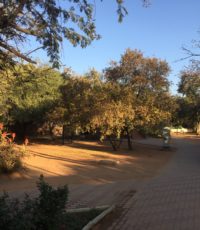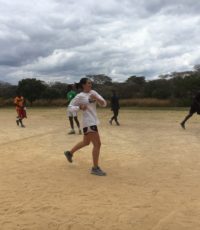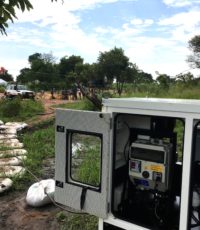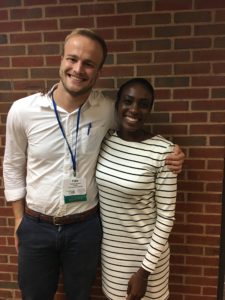September - October 2017
Thank you to everyone who came to honor the work of Jay Ireland and Dr. Paula Kahumbu at the 2017 Princeton in Africa Annual Gala. It was an inspiring night to celebrate innovation, investment and conservation across the African continent. Photos will be posted on our website and Facebook page soon!
The deadline for our 2018-19 fellowship application is quickly approaching! There are only a few more days to apply to be a 2018-19 Fellow. Submit your application today!
PiAf Connections
Please click below to check out pictures of our Fellows, Alums and other members of the PiAf family meeting up at home and around Africa.
Notes from the Field
By Luisa Banchoff, 2017-18 Fellow with Maru-a-Pula in Botswana

Luisa’s daily route to the history office, captured in the late afternoon.
Less than a week after graduating from Princeton, I found myself on a plane to Gaborone, Botswana. A few days later, I was standing at the front of a classroom, trying desperately to repeat the names of my students one by one. As Maru-a-Pula School’s newest history teacher, I had a lot of ground to cover. Not only did I have to commit 150 names to memory, but I also had to read up on the curricula I was teaching, get to know my colleagues, and navigate my complicated schedule.
Though it first seemed intentionally designed to trip up novices like myself, the schedule has become a valuable part of my day-to-day life at Maru-a-Pula. We rotate through a six-day cycle to ensure that classes occur on different days each week. And with such diverse and energetic students as mine, no day is ever the same. There is no “typical” day or week; rather, the differing needs of students and the uniqueness of each class dynamic means that the “routine” is far from predictable. Here are some highlights from two classes earlier in the term:
1st period: History with 1M (seventh graders). For the past several lessons, the 1Ms have been “teaching” the class about the early foundations of Apartheid. I split the class into groups, each of which must plan a lesson based on reading materials. Some of the students shine as future teachers, while others can’t keep a straight face in front of the class. The rest of the class loves asking questions of their “teachers.” This led to one of my favorite exchanges:
– Student: “What does A.D. stand for?”
– Teacher (rolling eyes, as if the answer is obvious): “After Death.”
– Student: “Whose death?”
– Teacher (shaking head): “Jesus’s.”
– Student: “But why Jesus’s?”
– Teacher: “Because most people in the world are Christian, obviously.”
– Student: “But why does that mean they get to measure time?”
(An excellent display of critical thinking, but not very useful for the task at hand… Also, A.D. actually stands for Anno Domini.)
4th period: History with 2L (eighth graders). My form 2s were rowdy today, despite the fact that they should focus on their impending exam. Class began with a guided meditation exercise, but as soon as I told them to listen to the sounds of their breaths, giggles started to spread through the room. It was a challenging lesson to say the least. I attempted to explain the Buddhist concept of reincarnation without the soul (which I’m still confused about after studying it for a whole semester last year). Unsurprisingly, we didn’t make it through all the material.
Now that the term has officially ended, I have a break from this weekly schedule. But I know that when school starts up again in September, a new schedule will be awaiting me. As I cover new ground in the classroom, I look forward to growing through the ups and downs of each new day.
Notes from the Field
By Mina Shah, 2017-18 Fellow with Kucetekela Foundation in Zambia

Mina runs after the ball as her team advances on the goal.
The first several weeks working at Kucetekela (KOO-chuh-tah-KAY-lah) Foundation in Lusaka have been largely incredible. I met the students that the Foundation sponsors and started to get to know each of them more personally. But starting here has also been extremely overwhelming; I think starting any new job is. It didn’t help much that when I first got here, we were beginning recruitment for our next class of Grade 8s. The number of interviews meant that there wasn’t much time to do office work in the day. As a result, there was much work that still needed to be finished on the nights and weekends.
Despite the workload, though, I have yet to experience any serious burnout (knock on wood). I think this is because most of the things that I’ve worked on during those nights and weekends are directly related to the students that KF supports. Some days, there is even a little time to unwind with them. As the students of Pestalozzi Education Centre were preparing for their end of term exams in August, I thought it might be nice to take some time to play a game of football (soccer) together. Mind you, I’m not very good at football; I’m athletic but pretty uncoordinated. To give you a sense of my abilities, I was invariably chosen last for teams during gym class in middle school.
Luckily, my students are much kinder than my peers were in upper primary and lower secondary school. They encouraged everyone as we made improvements in our playing or moved particularly adeptly. They generously shared the ball with everyone on the field and showed concern when someone got hurt. This is not to say, of course, that we didn’t engage in some friendly banter throughout the game!
After we had finished playing, we sat around and talked for a while; I taught some of them how to sew (a Grade 8 had a jacket that was in desperate need of some love), and we had conversations about critical race theory as it relates to police brutality and rap music in the U.S. That’s been one of my favorite things about working with these students so far: they are immensely curious. We transition between the mundane of daily exam study to the giggling playfulness of a game of football to the kinds of hyper-intellectual conversations about the politics of being in the world. And these transitions don’t feel abrupt at all. In fact, the seamless nature of those transitions is exactly what makes us learn so much from one another in such a comparatively short amount of time.
While things are busy and I’m still cautious of burnout, my students help keep me going. Even when work is actual work, they make that work feel a little more like play.
Notes from the Field
By Katherine Thomas-Canfield, 2017-18 Fellow with Lutheran World Federation in Uganda

Taken during one of Katie’s recent monitoring visits to Moyo. It shows a new, motorized water tracking system implemented in Palorinya using EU funds that, when completed, will provide 500 refugees and host community members with clean water.
My name is Katie Thomas-Canfield and I’ve been working for the Lutheran World Federation (LWF) in Uganda, based in the Adjumani field post, for the past four months. Adjumani, located about 15km south of the South Sudanese border, was the first reception site and has subsequently grown into one of the largest refugee settlements in the country amidst the South Sudanese refugee crisis. As one of the two Monitoring and Evaluation Officers in Adjumani, I am responsible for developing tools to measure the impact of LWF’s projects by engaging beneficiaries directly on both the successes and limitations of the programs, analyzing both quantitative and qualitative data and writing both internal and donor reports on these findings in order to identify and adopt best practices. Since my position is cross-cutting, I work closely with our staff on protection and gender-based violence, economic development, community peacebuilding, and water, hygiene and sanitation projects. In the short time since I started, my work has brought me from Kampala to Adjumani (including the Agojo, Nyumanzi, Baratuku and Pagrinya Settlements) to Moyo (including the Palorinya I, II and III Settlements) to the Elegu Refugee Reception Center (approximately 300 feet from South Sudan) to Gulu and Lira Towns (where a number of our sponsored vocational students study). This is my first experience inhabiting a space of constant crisis, of work days stretching from the early hours of the morning until late in the night, of intimately interacting with vulnerable populations, of having to depend deeply on the insight and experiences of my colleagues because arrogance could place the life and livelihoods of many on the line.
In the intense whirlwind of the past months, I have visited and revisited two key issues. First, I am still navigating what it means to be a white, foreign woman in this context as it is imbued with a number of privileges including expectations of my capabilities, education and qualifications to not only do this work, but also supervise the work of several of my more experienced colleagues. Second, I am struggling to strike a balance between the collective and my individual needs. I see my colleagues work toward the perfection of projects, towards a collective improvement of emergency conditions for refugee and host community members alike, often at the expense of their social and familial lives. It’s a source of quick burnout and high turnover rates in the field. Thus, as someone looking to work in this sector for the long-haul, how or in what ways can I care for my individual mental health without being selfish or self-absorbed? I don’t foresee either of these issues being ‘resolved,’ but they’re ones that I’m taking seriously in how I conduct my work by 1) practicing humility while also prioritizing capacity-building and knowledge-sharing, 2) leaning into my work, and the degree of dedication it requires while also setting realistic limitations for my hours.
Notes from the Field
Alumni Update: Agatha Offorjebe

Agatha and Fritz Siegert (2013-14 Fellow with Maru-a-Pula in Botswana) at Fogarty Global Health Research Fellowship orientation. Agatha will be based in Malawi and Fritz will be in Uganda.
Raised by Nigerian immigrants, I grew up identifying strongly with the African continent as a member of the African Diaspora. In fact, I had always imagined that after a successful career in public health or medicine I would make frequent service trips back to Nigeria in my retirement; it would be my way to give back. So, when I learned about the Princeton in Africa fellowship, it felt like the perfect “gap-year” opportunity in the interim before I launched my domestically-based healthcare career. Eight years and 10 African countries later, I find myself packing my life into two large suitcases for yet another year-long adventure on the continent. This time I will be conducting research as a Malawi-based GloCal Fellow through the Fogarty Global Health Scholars and Fellows Program at the National Institute of Health. My decision to pursue this incredible opportunity is due in large part to my transformative experience working with the Teen Club Program through the Baylor Pediatric HIV/AIDS Initiative as a 2009-10 Fellow in Gaborone, Botswana.
As a PiAf Fellow I took advantage of the year’s numerous opportunities and rose to its many challenges. I grew both personally and professionally through the lasting relationships I built over the course of that year. I returned inspired to pursue medical training and with the realization that I did not have to wait until retirement before making my contribution to the good work being done on the continent. My time with PiAf continues to shape the direction of my career. After my fellowship, I returned to Botswana as the PiAf Program Manager and again to conduct research between my first and second year of medical school. And now, by a twist of fate, one of my research projects as a GloCal Fellow will be a study of Malawi’s Teen Club program, the same program from which I began this incredible journey. So with immense gratitude to the PiAf Fellowship program, I reflect fondly on the experiences of my fellowship year and look forward to a lifetime of opportunities to continue learning and growing on the African continent.






